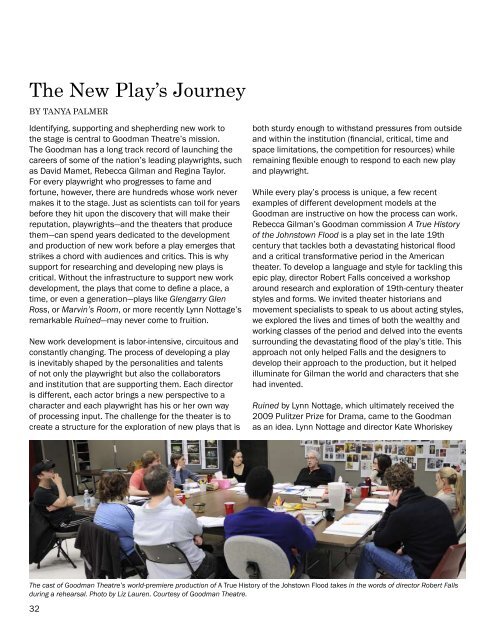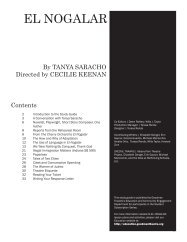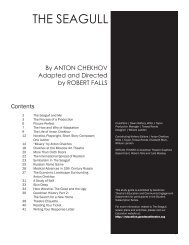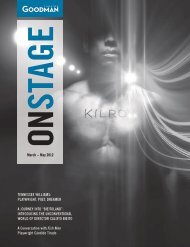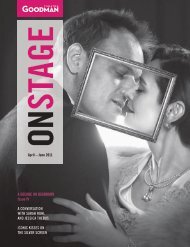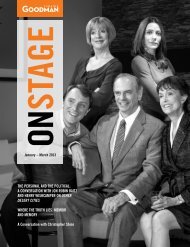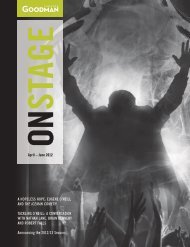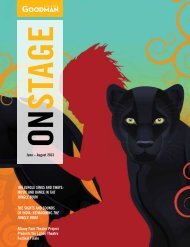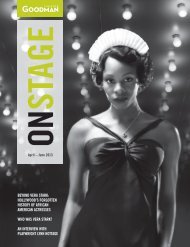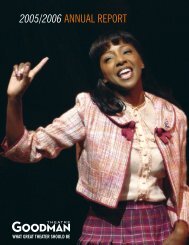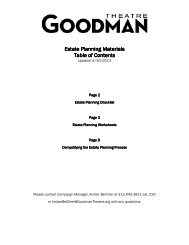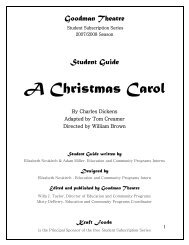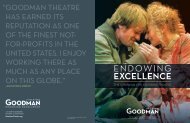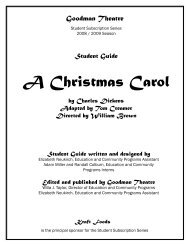A True History of the Johnstown Flood Study - Goodman Theatre
A True History of the Johnstown Flood Study - Goodman Theatre
A True History of the Johnstown Flood Study - Goodman Theatre
You also want an ePaper? Increase the reach of your titles
YUMPU automatically turns print PDFs into web optimized ePapers that Google loves.
The New Play’s Journey<br />
BY TANYA PALMER<br />
Identifying, supporting and shepherding new work to<br />
<strong>the</strong> stage is central to <strong>Goodman</strong> <strong>Theatre</strong>’s mission.<br />
The <strong>Goodman</strong> has a long track record <strong>of</strong> launching <strong>the</strong><br />
careers <strong>of</strong> some <strong>of</strong> <strong>the</strong> nation’s leading playwrights, such<br />
as David Mamet, Rebecca Gilman and Regina Taylor.<br />
For every playwright who progresses to fame and<br />
fortune, however, <strong>the</strong>re are hundreds whose work never<br />
makes it to <strong>the</strong> stage. Just as scientists can toil for years<br />
before <strong>the</strong>y hit upon <strong>the</strong> discovery that will make <strong>the</strong>ir<br />
reputation, playwrights—and <strong>the</strong> <strong>the</strong>aters that produce<br />
<strong>the</strong>m—can spend years dedicated to <strong>the</strong> development<br />
and production <strong>of</strong> new work before a play emerges that<br />
strikes a chord with audiences and critics. This is why<br />
support for researching and developing new plays is<br />
critical. Without <strong>the</strong> infrastructure to support new work<br />
development, <strong>the</strong> plays that come to define a place, a<br />
time, or even a generation—plays like Glengarry Glen<br />
Ross, or Marvin’s Room, or more recently Lynn Nottage’s<br />
remarkable Ruined—may never come to fruition.<br />
New work development is labor-intensive, circuitous and<br />
constantly changing. The process <strong>of</strong> developing a play<br />
is inevitably shaped by <strong>the</strong> personalities and talents<br />
<strong>of</strong> not only <strong>the</strong> playwright but also <strong>the</strong> collaborators<br />
and institution that are supporting <strong>the</strong>m. Each director<br />
is different, each actor brings a new perspective to a<br />
character and each playwright has his or her own way<br />
<strong>of</strong> processing input. The challenge for <strong>the</strong> <strong>the</strong>ater is to<br />
create a structure for <strong>the</strong> exploration <strong>of</strong> new plays that is<br />
both sturdy enough to withstand pressures from outside<br />
and within <strong>the</strong> institution (financial, critical, time and<br />
space limitations, <strong>the</strong> competition for resources) while<br />
remaining flexible enough to respond to each new play<br />
and playwright.<br />
While every play’s process is unique, a few recent<br />
examples <strong>of</strong> different development models at <strong>the</strong><br />
<strong>Goodman</strong> are instructive on how <strong>the</strong> process can work.<br />
Rebecca Gilman’s <strong>Goodman</strong> commission A <strong>True</strong> <strong>History</strong><br />
<strong>of</strong> <strong>the</strong> <strong>Johnstown</strong> <strong>Flood</strong> is a play set in <strong>the</strong> late 19th<br />
century that tackles both a devastating historical flood<br />
and a critical transformative period in <strong>the</strong> American<br />
<strong>the</strong>ater. To develop a language and style for tackling this<br />
epic play, director Robert Falls conceived a workshop<br />
around research and exploration <strong>of</strong> 19th-century <strong>the</strong>ater<br />
styles and forms. We invited <strong>the</strong>ater historians and<br />
movement specialists to speak to us about acting styles,<br />
we explored <strong>the</strong> lives and times <strong>of</strong> both <strong>the</strong> wealthy and<br />
working classes <strong>of</strong> <strong>the</strong> period and delved into <strong>the</strong> events<br />
surrounding <strong>the</strong> devastating flood <strong>of</strong> <strong>the</strong> play’s title. This<br />
approach not only helped Falls and <strong>the</strong> designers to<br />
develop <strong>the</strong>ir approach to <strong>the</strong> production, but it helped<br />
illuminate for Gilman <strong>the</strong> world and characters that she<br />
had invented.<br />
Ruined by Lynn Nottage, which ultimately received <strong>the</strong><br />
2009 Pulitzer Prize for Drama, came to <strong>the</strong> <strong>Goodman</strong><br />
as an idea. Lynn Nottage and director Kate Whoriskey<br />
The cast <strong>of</strong> <strong>Goodman</strong> <strong>Theatre</strong>’s world-premiere production <strong>of</strong> A <strong>True</strong> <strong>History</strong> <strong>of</strong> <strong>the</strong> Johstown <strong>Flood</strong> takes in <strong>the</strong> words <strong>of</strong> director Robert Falls<br />
during a rehearsal. Photo by Liz Lauren. Courtesy <strong>of</strong> <strong>Goodman</strong> <strong>Theatre</strong>.<br />
32


